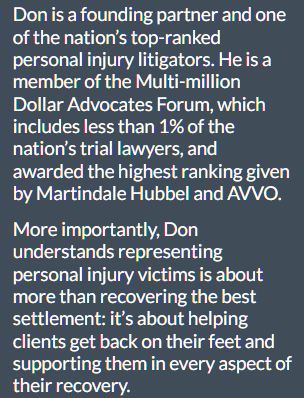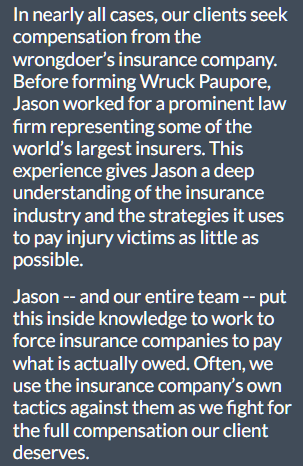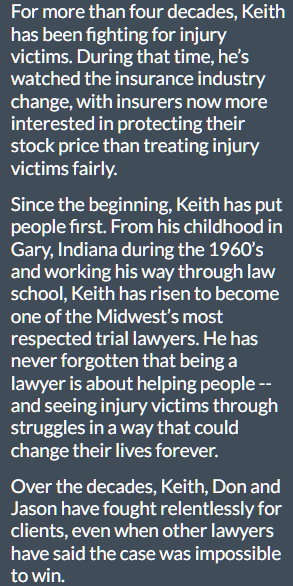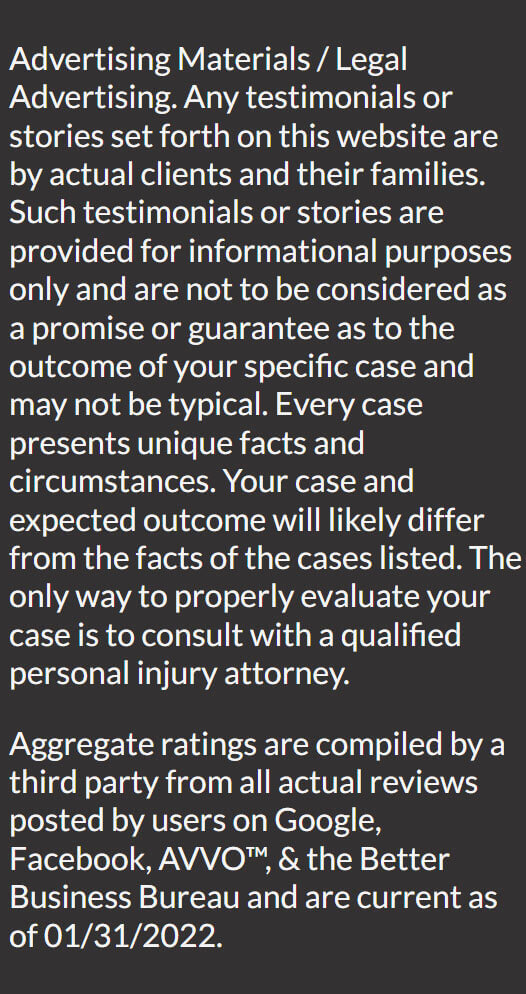




If you have suffered a personal injury, denial of your personal injury claim can be a frustrating and disheartening experience. However, a claim denial does not necessarily mean the end of your pursuit for compensation.
In Indiana, legal options besides insurance are available to help you seek compensation for your injuries. One of the most important steps you can take after a claim denial is to consult with our team, who can help you potentially pursue a lawsuit against the party that injured you in the event your initial claim is denied. This can be a complex task, but with the right legal guidance, you can navigate the claims process and protect your rights.
Contact Wruck Paupore by calling (219) 322-1166 for a free case assessment with our Indiana personal injury attorneys.
Sustaining injuries because of someone else's negligence can be a traumatic experience, and filing a personal injury claim is often the first step toward seeking compensation for the losses incurred. However, there might be instances when the negligent party’s insurance company denies your personal injury claim.
Insurance claims can be denied for many reasons, including insufficient evidence, late filing, or other limitations. Unfortunately, these reasons are often used as a smokescreen by insurance companies to deny people the compensation they rightly deserve. That is why the personal injury claims process is not limited to just filing a claim with the other person’s insurance provider.
A personal injury claim can be thought of as two parts of the same process: initial insurance negotiations and, if unsuccessful, a lawsuit. Our experienced Indiana personal injury attorneys know these two parts go hand-in-hand, as a lawsuit is used as part of the claim negotiations. If negotiations fail, going to court with a lawsuit might still succeed in recovering the damages you deserve. We can do this on our client’s behalf so that the injured person can concentrate on healing rather than the process of financial recovery.
To initiate the claims process, start by submitting a formal claim to the at-fault party’s insurance company. This process involves providing detailed information about the incident, including the date, time, and location of the accident, as well as any injuries sustained and supporting documentation such as medical records and police reports.
Once your claim is filed, the insurance company will conduct an investigation to assess liability and evaluate the validity of your claim. This investigation might involve reviewing medical records, interviewing witnesses, and gathering other relevant evidence.
After the investigation, the insurance company will evaluate your claim based on several factors, including liability, the extent of your injuries, and any applicable exclusions or limitations outlined in the at-fault party’s policy.
If the insurance company determines that your claim does not meet their criteria for compensation, they will deny your claim. In such a case, you will receive a written explanation outlining the reasons for the denial.
This is why the lawsuit option exists. The at-fault party’s insurance company does not want to payout on claims so will often site unfounded reasons not to do so, particularly if an individual is not represented by a lawyer. So, if the insurance claim process fails, do not worry. When disagreements arise during insurance negotiations, it is usually time to turn to the lawsuit part of the process to hold them accountable.
If your insurance claim has been denied, you still have the option to file a personal injury lawsuit against the at-fault party in Indiana, which will still allow you to recover against the insurer. This legal process involves initiating legal proceedings in court and presenting your case before a judge or jury.
Gathering and presenting compelling evidence to support your claim is crucial to build a strong case. This might include medical records, expert testimony, accident reconstruction reports, and other relevant documents. Much of this evidence was likely collected when you filed your insurance claim. However, we can help you collect and organize other pieces of evidence to present a clear and convincing case.
Before going to trial, there will usually be opportunities for negotiation and settlement discussions with the opposing party or their insurance company. As mentioned, these two processes work together, so an insurance claim can still be successfully negotiated even after your lawsuit is filed. We can advise you on the fairness of any settlement offers and help you navigate this stage of the process. It is important to carefully consider any settlement offers and ensure they adequately compensate you for your injuries while comparing them with the costs of going to court and the likelihood of success.
Your case will proceed to trial if a fair settlement cannot be reached. During the trial, we will present evidence, witnesses will testify, and a judge or jury will determine the outcome. During a trial, we can argue your case in the most favorable light possible. If successful, you could be awarded compensation for not only your injuries but other losses, like pain and suffering caused by emotional trauma.
If your personal injury claim is denied and you lose your lawsuit at trial, you have the right to appeal the decision and seek a reconsideration of your claim.
If necessary, our team will draft persuasive appeals to address any reasons why your legal action was unsuccessful in an effort to have the case sent back to the trial court. However, it is very rare in our practice for injury cases to progress to this point, as the vast majority are successfully resolved before this point. In most cases, the combination of filing an insurance claim and a lawsuit against the at-fault party is enough to get justice for the harm done to you.
For a free review of your case with our Indianapolis personal injury lawyers, call Wruck Paupore today at (219) 322-1166.
Don is a founding partner and one of the nation’s top-ranked personal injury litigators. He is a member of the Multi-million Dollar Advocates Forum, which includes less than 1% of the nation’s trial lawyers, and awarded the highest ranking given by Martindale Hubbel and AVVO.
More importantly, Don understands representing personal injury victims is about more than recovering the best settlement: it’s about helping clients get back on their feet and supporting them in every aspect of their recovery.

In nearly all cases, our clients seek compensation from the wrongdoer’s insurance company. Before forming Wruck Paupore, Jason worked for a prominent law firm representing some of the world’s largest insurers. This experience gives Jason a deep understanding of the insurance industry and the strategies it uses to pay injury victims as little as possible.
Jason -- and our entire team -- put this inside knowledge to work to force insurance companies to pay what is actually owed. Often, we use the insurance company’s own tactics against them as we fight for the full compensation our client deserves.

For more than four decades, Keith has been fighting for injury victims. During that time, he’s watched the insurance industry change, with insurers now more interested in protecting their stock price than treating injury victims fairly.
Since the beginning, Keith has put people first. From his childhood in Gary, Indiana during the 1960’s and working his way through law school, Keith has risen to become one of the Midwest’s most respected trial lawyers. He has never forgotten that being a lawyer is about helping people -- and seeing injury victims through struggles in a way that could change their lives forever.
Over the decades, Keith, Don and Jason have fought relentlessly for clients, even when other lawyers have said the case was impossible to win.


© 2025
Terms of Service | Privacy Policy | Resources | Blog | Sitemap

© 2022 Wruck Paupore PC
Terms of Service | Privacy Policy